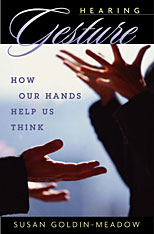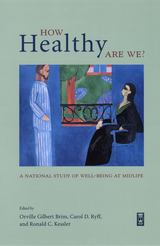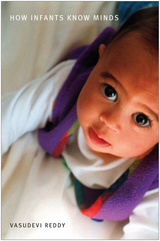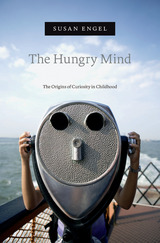4 start with H start with H

Many nonverbal behaviors—smiling, blushing, shrugging—reveal our emotions. One nonverbal behavior, gesturing, exposes our thoughts. This book explores how we move our hands when we talk, and what it means when we do so.
Susan Goldin-Meadow begins with an intriguing discovery: when explaining their answer to a task, children sometimes communicate different ideas with their hand gestures than with their spoken words. Moreover, children whose gestures do not match their speech are particularly likely to benefit from instruction in that task. Not only do gestures provide insight into the unspoken thoughts of children (one of Goldin-Meadow’s central claims), but gestures reveal a child’s readiness to learn, and even suggest which teaching strategies might be most beneficial.
In addition, Goldin-Meadow characterizes gesture when it fulfills the entire function of language (as in the case of Sign Languages of the Deaf), when it is reshaped to suit different cultures (American and Chinese), and even when it occurs in children who are blind from birth.
Focusing on what we can discover about speakers—adults and children alike—by watching their hands, this book discloses the active role that gesture plays in conversation and, more fundamentally, in thinking. In general, we are unaware of gesture, which occurs as an undercurrent alongside an acknowledged verbal exchange. In this book, Susan Goldin-Meadow makes clear why we must not ignore the background conversation.

The MacArthur Foundation addressed these questions head-on by funding a landmark study known as "Midlife in the U.S.," or MIDUS. For the first time in a single study, researchers were able to integrate epidemiological, sociological, and psychological assessments, as well as innovative new measures to evaluate how work and family life influence each other.
How Healthy Are We? presents the key findings from the survey in three sections: physical health, quality of life and psychological well-being, and the contexts (family, work) of the midlife. The topics covered by almost forty scholars in a wide variety of fields are vast, including everything from how health and well-being vary with socioeconomic standing, gender, race, or region of the country to how middle-aged people differ from younger or older adults in their emotional experience and quality of life. This health—the study measures not only health-the absence of illness—but also reports on the presence of wellness in middle-aged Americans.
The culmination of a decade and a half of research by leading scholars, How Healthy Are We? will dramatically alter the way we think about health in middle age and the factors that influence it. Researchers, policymakers, and others concerned about the quality of midlife in contemporary America will welcome its insights.
* Having a good life means having good relationships with others to almost 70% of those surveyed. Less than 40% mentioned their careers.
* Reports of disruptive daily stressors vary by age, with young adults and those in midlife experiencing more than those in later adulthood.
* Men have higher assessments of their physical and mental health than woman until the age of 60.

Most psychologists claim that we begin to develop a “theory of mind”—some basic ideas about other people’s minds—at age two or three, by inference, deduction, and logical reasoning.
But does this mean that small babies are unaware of minds? That they see other people simply as another (rather dynamic and noisy) kind of object? This is a common view in developmental psychology. Yet, as this book explains, there is compelling evidence that babies in the first year of life can tease, pretend, feel self-conscious, and joke with people. Using observations from infants’ everyday interactions with their families, Vasudevi Reddy argues that such early emotional engagements show infants’ growing awareness of other people’s attention, expectations, and intentions.
Reddy deals with the persistent problem of “other minds” by proposing a “second-person” solution: we know other minds if we can respond to them. And we respond most richly in engagement with them. She challenges psychology’s traditional “detached” stance toward understanding people, arguing that the most fundamental way of knowing minds—both for babies and for adults—is through engagement with them. According to this argument the starting point for understanding other minds is not isolation and ignorance but emotional relation.

Despite American education’s recent mania for standardized tests, testing misses what really matters about learning: the desire to learn in the first place. Curiosity is vital, but it remains a surprisingly understudied characteristic. The Hungry Mind is a deeply researched, highly readable exploration of what curiosity is, how it can be measured, how it develops in childhood, and how it can be fostered in school.
“Engel draws on the latest social science research and incidents from her own life to understand why curiosity is nearly universal in babies, pervasive in early childhood, and less evident in school…Engel’s most important finding is that most classroom environments discourage curiosity…In an era that prizes quantifiable results, a pedagogy that privileges curiosity is not likely to be a priority.”
—Glenn C. Altschuler, Psychology Today
“Susan Engel’s The Hungry Mind, a book which engages in depth with how our interest and desire to explore the world evolves, makes a valuable contribution not only to the body of academic literature on the developmental and educational psychology of children, but also to our knowledge on why and how we learn.”
—Inez von Weitershausen, LSE Review of Books
READERS
Browse our collection.
PUBLISHERS
See BiblioVault's publisher services.
STUDENT SERVICES
Files for college accessibility offices.
UChicago Accessibility Resources
home | accessibility | search | about | contact us
BiblioVault ® 2001 - 2024
The University of Chicago Press









